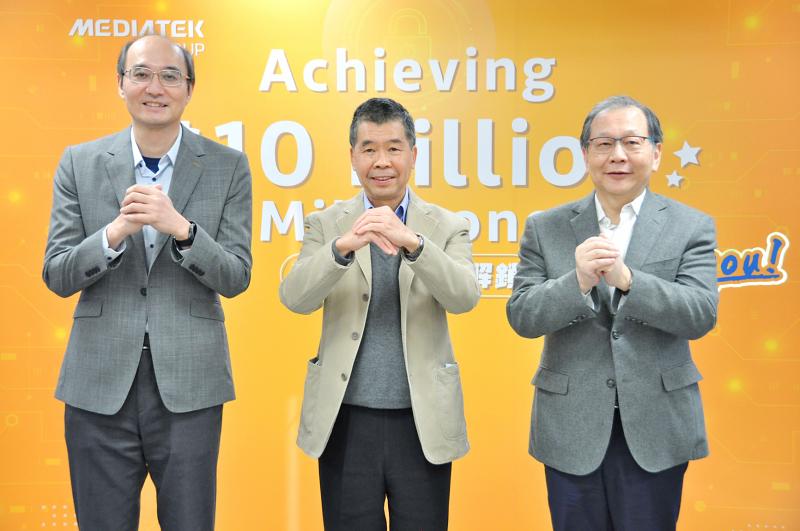MediaTek Inc (聯發科) yesterday announced it would give incentive bonuses totaling NT$1.7 billion (US$59.7 million) to its employees and those at the firm’s major subsidiaries, after the smartphone chip supplier’s revenue hit US$10 billion last year.
This is the biggest incentive bonus the Hsinchu-based handset chip designer has ever distributed in its 23-year history.
About 17,000 full-time employees of MediaTek and five of its subsidiaries, including Richtek Technology Corp (立錡科技) and Airoha Technology Corp (絡達科技), would receive a “red envelope” of NT$100,000 each, the company said.

Photo courtesy of MediaTek Inc
“Surpassing US$10 billion is just the beginning. We will continue to [grow] on this basis,” MediaTek said in a statement.
MediaTek, which has about 10,000 employees in Taiwan, said it has also allocated 20 percent of its annual distributable earnings for local employees’ year-end bonuses.
MediaTek posted NT$322.15 billion in consolidated revenue last year, up 30.84 percent from NT$246.22 billion in 2019, a record for the company, as its 5G smartphone chips were adopted by a growing number of vendors.
LG Electronics Co and Chinese smartphone vendors, including Realme Mobile Telecommunications (Shenzhen) Co (銳爾覓移動通信), Xiaomi Corp (小米), Vivo Communication Technology Co (維沃) and Oppo Mobile Telecommunications Corp (歐珀), use MediaTek’s 5G Dimensity chips in their latest handsets.
MediaTek last quarter overtook Qualcomm Inc as the world’s biggest smartphone chipset supplier for the first time, as its affordable chips gained traction in emerging markets, a tally by market researcher Counterpoint showed.

TAKING STOCK: A Taiwanese cookware firm in Vietnam urged customers to assess inventory or place orders early so shipments can reach the US while tariffs are paused Taiwanese businesses in Vietnam are exploring alternatives after the White House imposed a 46 percent import duty on Vietnamese goods, following US President Donald Trump’s announcement of “reciprocal” tariffs on the US’ trading partners. Lo Shih-liang (羅世良), chairman of Brico Industry Co (裕茂工業), a Taiwanese company that manufactures cast iron cookware and stove components in Vietnam, said that more than 40 percent of his business was tied to the US market, describing the constant US policy shifts as an emotional roller coaster. “I work during the day and stay up all night watching the news. I’ve been following US news until 3am

UNCERTAINTY: Innolux activated a stringent supply chain management mechanism, as it did during the COVID-19 pandemic, to ensure optimal inventory levels for customers Flat-panel display makers AUO Corp (友達) and Innolux Corp (群創) yesterday said that about 12 to 20 percent of their display business is at risk of potential US tariffs and that they would relocate production or shipment destinations to mitigate the levies’ effects. US tariffs would have a direct impact of US$200 million on AUO’s revenue, company chairman Paul Peng (彭雙浪) told reporters on the sidelines of the Touch Taiwan trade show in Taipei yesterday. That would make up about 12 percent of the company’s overall revenue. To cope with the tariff uncertainty, AUO plans to allocate its production to manufacturing facilities in

Six years ago, LVMH’s billionaire CEO Bernard Arnault and US President Donald Trump cut the blue ribbon on a factory in rural Texas that would make designer handbags for Louis Vuitton, one of the world’s best-known luxury brands. However, since the high-profile opening, the factory has faced a host of problems limiting production, 11 former Louis Vuitton employees said. The site has consistently ranked among the worst-performing for Louis Vuitton globally, “significantly” underperforming other facilities, said three former Louis Vuitton workers and a senior industry source, who cited internal rankings shared with staff. The plant’s problems — which have not

COLLABORATION: Given Taiwan’s key position in global supply chains, the US firm is discussing strategies with local partners and clients to deal with global uncertainties Advanced Micro Devices Inc (AMD) yesterday said it is meeting with local ecosystem partners, including Taiwan Semiconductor Manufacturing Co (TSMC, 台積電), to discuss strategies, including long-term manufacturing, to navigate uncertainties such as US tariffs, as Taiwan occupies an important position in global supply chains. AMD chief executive officer Lisa Su (蘇姿丰) told reporters that Taiwan is an important part of the chip designer’s ecosystem and she is discussing with partners and customers in Taiwan to forge strong collaborations on different areas during this critical period. AMD has just become the first artificial-intelligence (AI) server chip customer of TSMC to utilize its advanced